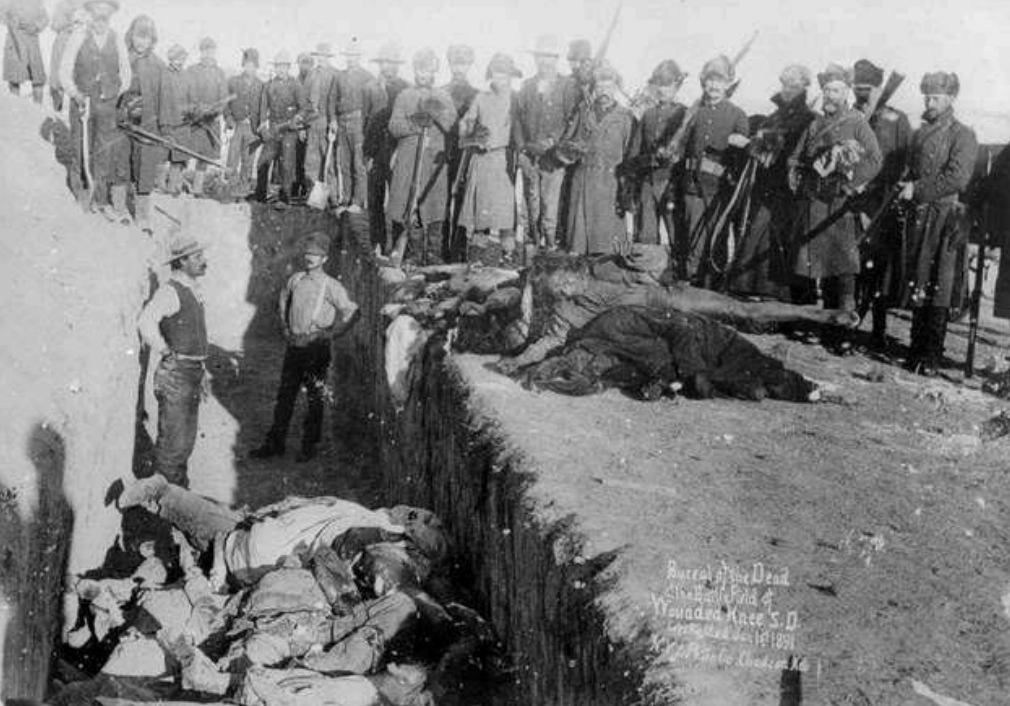
- Details
- By Levi Rickert
The Remove the Stain Act of 2025 will be reintroduced by Senators Elizabeth Warren (D–MA) and Jeff Merkley (D–OR), along with Representative Jill Tokuda (D–HI), on Thursday, according to Sen. Warren’s Senate office.
The Remove the Stain Act is a historic effort to address a long-standing injustice stemming from one of the darkest moments in U.S. military history—the Wounded Knee Massacre. This legislation aims to rescind twenty Medals of Honor awarded to U.S. soldiers for their role in the 1890 massacre of hundreds of Lakota men, women, and children at Wounded Knee on the Pine Ridge Indian Reservation in South Dakota.
"We cannot be a country that celebrates and rewards horrifying acts of violence against Native people," said Sen. Warren. "Congress must recognize how shameful this massacre was and take an important step toward justice for the Lakota people."
“We must acknowledge our history and take concrete steps to right historic wrongs from America’s darkest chapters,” said Sen. Merkley. "Moving forward together as a nation demands we remember, reflect on, and work to rectify the abhorrent massacre of hundreds of innocent Lakota men, women, and children at Wounded Knee. This horrific injustice is not deserving of our nation’s highest award for military valor, and our long-overdue bill helps finally set the record straight by revoking these medals.”
“The massacre of hundreds of unarmed Lakota men, women, and children at Wounded Knee was a crime against humanity, and honoring the perpetrators with the Medal of Honor adds insult to that deep wound. The Remove the Stain Act is about facing the truth, no matter how painful,” said Rep.Tokuda. “I’m proud to introduce this bill to revoke medals that should never have been given, because healing begins with honesty—and the Lakota people deserve nothing less.”
The Wounded Knee Massacre occurred on December 29, 1890, when U.S. troops opened fire on a peaceful band of Lakota people, killing an estimated 250 to 300 individuals—many of whom were unarmed. Despite the horrific nature of this attack, the soldiers involved were later awarded the Medal of Honor, the nation’s highest military decoration, intended to recognize acts of extraordinary bravery. In this case, however, the medals honored not gallantry but an atrocity that has since been widely condemned by historians, Native communities, and even Congress itself.
The act of removing these medals would not be unprecedented. In 1916, Congress created a board to review previous Medal of Honor awards, ultimately rescinding more than 900 that did not meet the established criteria. The Remove the Stain Act builds on that precedent, arguing that awarding these medals for actions at Wounded Knee was not only a grave mistake but a continuing symbol of disrespect to Native American communities.
The bill has been introduced in various forms since 2019 and has gained widespread support across Indigenous communities, advocacy groups, and veteran organizations. Endorsers include the National Congress of American Indians (NCAI), the United South and Eastern Tribes Sovereignty Protection Fund, and numerous Sioux tribes directly affected by the massacre, such as the Oglala, Rosebud, and Cheyenne River Sioux Tribes. The Spotted Elk, Afraid of Hawk, and LeBeau families—descendants of those killed—have also voiced strong support, as have groups like Veterans for Peace and VoteVets, who argue that honoring war crimes damages the integrity of military recognition.
Barb and OJ Semans Sr, Co-Executive Directors with Four Directions Native Vote bave been working with the Wounded Knee Massacre descendants since 2019 when the first bill was introduced.
"We will continue to seek justice for the Descendants who lost their relatives who were elders and children massacred while presenting a white flag and under the protection of the United States," Semans said to Native News Online. "We send out heartfelt gratitude to the Honorable Senators Warren and Merkley and the Honorable Representative Tokuda reinduction of the bill in the 119th Congress."
This legislation is more than symbolic. It acknowledges the historical trauma inflicted upon Native peoples and seeks to restore dignity by officially rejecting the glorification of a mass killing. The Remove the Stain Act also serves as a broader call for the U.S. government to reckon with its history of violence against Indigenous communities—a history often overlooked or sanitized in mainstream discourse.
Passing the Remove the Stain Act of 2025 would mark a significant step toward healing and justice. By rescinding these medals, Congress can send a powerful message: that valor must never be confused with violence, and that the highest honors of this nation must reflect its highest values.
More Stories Like This
Native News Weekly (August 25, 2024): D.C. BriefsTwo Native Americans Named to Democratic Congressional Campaign Committee's“Red to Blue” Program
Cheyenne River Youth Project Hosts Young Women’s Winter Camp as Part of Lakota Culture Internship
Showing Up When It Matters: Flanagan’s Response to Minnesota’s Immigration Crisis
Monday Morning: (February 23, 2026): Articles You May Have Missed This Past Weekend
Help us defend tribal sovereignty.
At Native News Online, our mission is rooted in telling the stories that strengthen sovereignty and uplift Indigenous voices — not just at year’s end, but every single day.
Because of your generosity last year, we were able to keep our reporters on the ground in tribal communities, at national gatherings and in the halls of Congress — covering the issues that matter most to Indian Country: sovereignty, culture, education, health and economic opportunity.
That support sustained us through a tough year in 2025. Now, as we look to the year ahead, we need your help right now to ensure warrior journalism remains strong — reporting that defends tribal sovereignty, amplifies Native truth, and holds power accountable.
 The stakes couldn't be higher. Your support keeps Native voices heard, Native stories told and Native sovereignty defended.
The stakes couldn't be higher. Your support keeps Native voices heard, Native stories told and Native sovereignty defended.
Stand with Warrior Journalism today.
Levi Rickert (Potawatomi), Editor & Publisher


